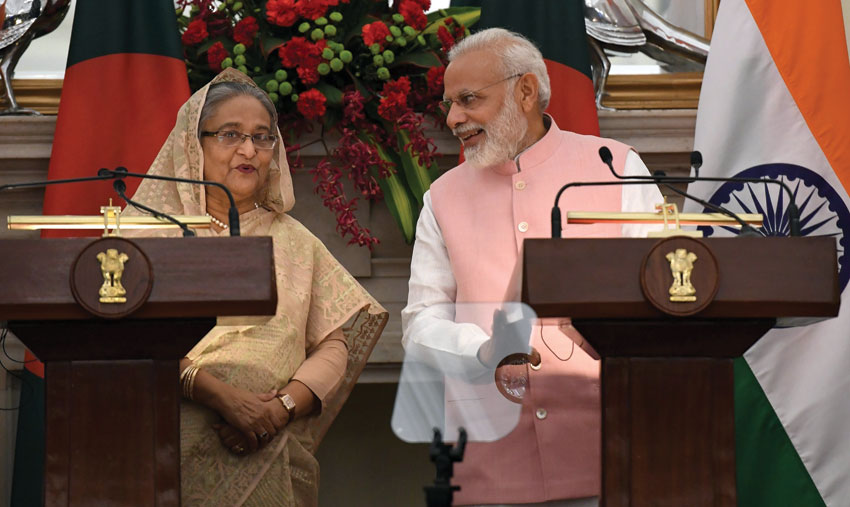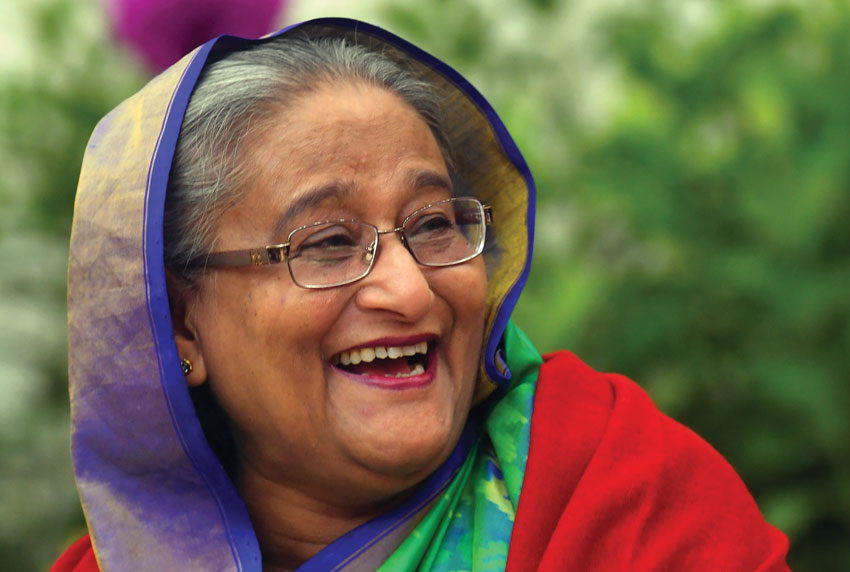Hasina’s Victory Comforts New Delhi: India Gains from a Solid Bangladesh
Bangladesh Prime Minister Sheikh Hasina smiles while speaking at a press conference in Dhaka on Dec. 31, 2018. Bangladesh Prime Minister Sheikh Hasina has secured a fourth term with a landslide victory in polls the opposition slammed as “farcical” over claims of vote-rigging, and clashes between rival supporters that killed at least 17 people. (Indranil Mukherjee/AFP/Getty Images)
Amidst changes in governments in all South Asian neighbors of India, Bangladesh is the only one that has opted to repeat the ruling political coalition, with its citizens according Sheikh Hasina’s Bangladesh Awami League-led political dispensation an astounding mandate of 288 out of 300 seats in the recently held general elections to the ‘Jatiya Sangsad’ or Parliament, writes Priyanka Bhardwaj.
For Hasina, who is alleged by the opposition to have resorted to massive vote-rigging, thereby justifying their demand for fresh polls, this is her fourth win, and third straight term as the Prime Minister (PM).
Leading the international community in congratulating her for her stupendous victory was the Indian PM Narendra Modi, who, according to the press secretary of the Bangladeshi PM, Ihsanul Karim, said, “Hasina’s victory was the reflection of Bangladesh’s stunning development under her dynamic leadership.”
New Delhi’s enthusiasm over Hasina’s win is based on the unprecedented strides in bilateral relations between the two countries that her stable tenure had ensured.
Both government and observers of South Asian geopolitics feel that considering the trends of the past it would not be off the mark to witness continuance of this golden period.
The Indo-Bangla partnership has already spawned over the joint inauguration of 19 development projects pertaining to infrastructure and transit, conclusion of approximately 90 bilateral agreements in new areas of space, IT, electronics, cyber-security, and civil nuclear energy among others, use of Bangladesh ports and land territory for easy access to India’s North East that has promoted India’s “Act East” policy, resolution of border, maritime and river water sharing disputes, and a huge spurt in tourism revenues with visible spike in Bangladeshi tourists visiting India.
In terms of remittances, Bangladesh ranks fourth in the list of countries from where the highest remittances come to India, an amount of $80 billion to the country.
Also, the trade balance stands now heavily in favor of New Delhi, with bilateral trade surpassing $9 billion, as Bangladesh’s exports to India touch $900 million or 10% of total bilateral trade figures.
Given these facts and that India has decided to keep raising its stakes in Bangladesh’s economy, exponentially, underlines the centrality of Dacca’s stability to India.
Long considered a basket case, and with 71% population living below poverty line at the time of its independence in 1971, Bangladesh under Hasina’s decade-long rule has become a story of economic development, with growth averaging close to 7%.
Despite its purported authoritarian regime, the country earned plaudits for its human development indicators, thriving grassroots-export sector, and spirited struggle to become a “middle income economy” from the likes of Nobel-winning economist, Amartya Sen.
Apparently buoyed by Hasina’s success, in terms of growth figures, her party in its pre-poll manifesto promised the citizens of 9% growth if voted back to power, reflecting their determination to prioritize development and preventing any defenders of religion from sabotaging the country’s policies.
As both India and Bangladesh share a 4,000 km border, cultural affinity, and are plagued by similar sets of issues of drug trafficking, organized crime and terrorism, this stand of Hasina has only gone on to immensely benefit India that has sought to partner with Dacca in eliminating and containing fundamentalism and terrorism in South Asia.

The veracity of her commitment to curtailing terrorist activity was amply evident when Bangladesh handed over Anup Chetia, Assam General Secretary of the United Liberation Front to India, and other such kingpins of insurgent groups, all of which have resulted in a dramatic fall in militancy in India’s restive regions of northeast.
Since January 2009, when she first came to power, Hasina has stuck to her resolve to not allow any anti-India activity on Bangladeshi soil, despite her facing a situation of ethnic conflicts, sporadic infiltration of Rohingya refugees from neighboring Myanmar, and smuggling of fake currency.
Juxtaposed with the radical Bangladesh of 2000s during Bangladesh Nationalist Party’s Khaleda Zia’s tenure, and India’s western neighbor, Pakistan that has degraded into an exporter of terrorism, Hasina’s uncompromising views on political Islamism, commitment to the values of Bengali identity, and unwavering economic positivity has been a sort of relief to peaceniks.
Furthermore, analysts observe that New Delhi might moot an alternative to the South Asian Association for Regional Cooperation with the help of Bangladesh.
However, in its bid to bring the South Asian and Indo-Pacific regions under its influence, and possibly to strategically encircle India, an overaggressive Beijing has succeeded in turning Bangladesh into its second largest buyer of arms and emerged as its biggest trading partner.
China, also, has offered loans worth $24 billion as part of its bilateral assistance to Dacca for infrastructure projects under the Belt and Road Initiative during President Xi Jinping’s historic visit in 2016.
For India to counter Beijing’s designs, it would need to strengthen its economic outreach to enable it to become a springboard of political, cultural and strategic enhancement and integration.
The glitches in India’s relations with Bangladesh that may need to be culled are security concerns from illegal Bangladeshi infiltration into India, resolution of citizenship row in Assam, and assurance to Bangladesh in repatriation of Rohingya refugees over which it has faced strict UN denouncement.
In the interests of long-term fortunes of a strategically helpful neighbor, Bangladesh, New Delhi must use it ample leverage to influence Hasina to bolster democratic institutions in her active pursuit of governance and economic growth, and push her government to settle its tensions with its opposition, critics and media before it manifests in resultant forms, once her tenure comes to an end.


